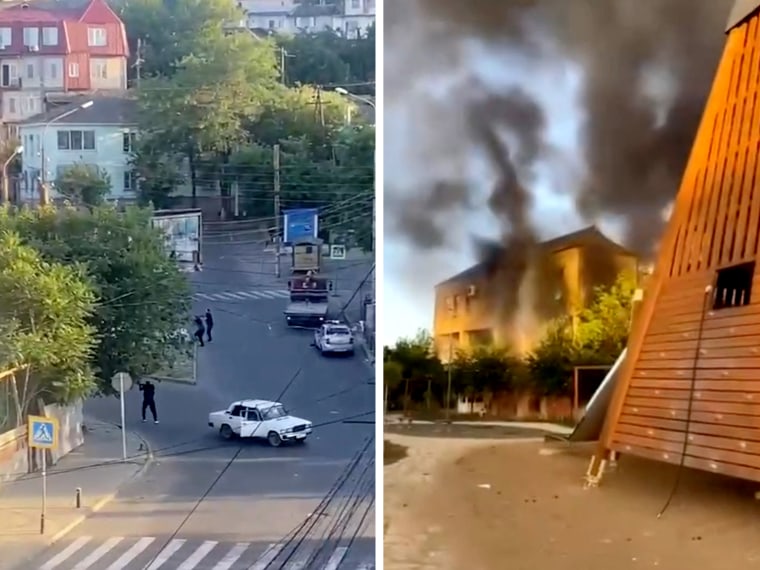A terrorist group targeted Jewish synagogues and Orthodox Christian houses of worship in two cities in southern Russia’s Dagestan region on Sunday, killing multiple civilians and about a dozen police officers who were defending the institutions and responding to the attacks, said U.S. officials.
The officials said that reports from the regions indicate the attackers used firebombs and firearms and slit the throat of a high-ranking Orthodox priest, attacking congregants during services on an Orthodox holiday.
The Russian government said that five terrorists were killed, and that 19 other people died in the attack, 15 of them police.
The violence in the regional capital of Makhachkala and nearby Derbent was the latest that officials blamed on Islamic extremists in the predominantly Muslim region in the North Caucasus, as well as the deadliest in Russia since March, when gunmen opened fire at a concert in suburban Moscow, killing 145 people.
ISIS-K, the affiliate of the Islamic State group in Afghanistan that claimed responsibility for March’s raid quickly praised the attack in Dagestan, saying it was conducted by “brothers in the Caucasus who showed that they are still strong.”
The Washington-based Institute for the Study of War argued that the Islamic State group’s North Caucasus branch, Vilayat Kavkaz, likely was behind the attack, describing it as “complex and coordinated.”

Dagestan Gov. Sergei Melikov blamed members of Islamic “sleeper cells” directed from abroad, but didn’t give any other details. He said in a video statement that the assailants aimed at “sowing panic and fear,” and attempted to link the attack to Moscow’s military action in Ukraine — but also provided no evidence.
Three U.S. officials noted that no arm of ISIS has yet taken public credit for the attack.
Among the dead was the Rev. Nikolai Kotelnikov, a 66-year-old Russian Orthodox priest at a church in Derbent. The attackers slit his throat before setting fire to the church, according to Shamil Khadulayev, deputy head of a local public oversight body. The attack came as the Orthodox faithful celebrated Pentecost, also known as Trinity Sunday.
The Kele-Numaz synagogue in Derbent also was set ablaze.
Shortly after the attacks in Derbent, militants fired at a police post in Makhachkala and attacked a Russian Orthodox Church and a synagogue there before being hunted down and killed by special forces, according to Russian officials.
There were reports that hostages were taken inside one of the churches that was attacked, but it appears that was parishioners barricading themselves inside for protection, the U.S. officials said.
Medical authorities in Dagestan said 16 people, including 13 police, were hospitalized with injuries, and with four officers in grave condition.
Kremlin spokesman Dmitry Peskov said President Vladimir Putin has received reports on Sunday’s attacks and efforts to help the victims.
In the early 2000s, Dagestan saw near-daily attacks on police and other authorities that was blamed on militant extremists. After the emergence of the Islamic State group, many residents of the region joined it in Syria and Iraq.
The violence in Dagestan has abated in recent years, but in a sign that extremist sentiments still run high in the region, mobs rioted at an airport there in October, targeting a flight from Israel. More than 20 people were hurt — none of them Israelis — when hundreds of men, some carrying banners with antisemitic slogans, rushed onto the tarmac, chased passengers and threw stones at police.
After March’s Moscow concert hall attack, Russia’s top security agency reported that it had broken up what it called a “terrorist cell” in southern Russia and arrested four of its members who had provided weapons and cash to suspected attackers in Moscow.



